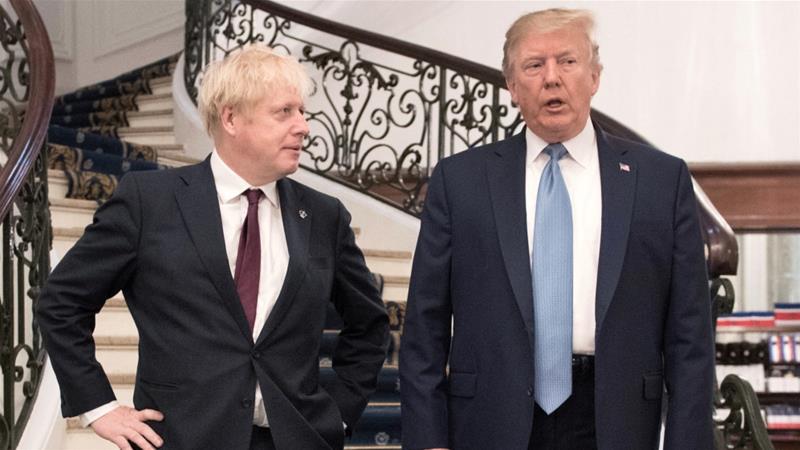Almost five years ago, in October 2015, Chinese President Xi Jinping paid his first state visit to the United Kingdom. The David Cameron government in the UK, which was reelected with full majority before a few months, projected this as the “Golden Era” of Sino-British relations. In the next few years, the relations between two countries peaked, thanks to Britain’s Sinophile finance minister George Osborne.
Britain became among the first Western nations to welcome Huawei for the country’s 5G network roll-out program, and trade and investment relations expanded. China helped Britain build nuclear power plants and purchased many big real estate properties and football clubs in the country.
However, in November 2016, Donald Trump was elected as the President of the United States and he was clearly averse to the fact that the UK, America’s natural ally, is tilting towards China- America’s arch-rival in Trump’s eye.
Within a year after his election, Trump launched a trade war against China and started pressurizing allies in Europe and Asia to go hard on the Chinese government. However, Theresa May, who succeeded Cameron as PM, found Chinese investment too attractive to shun relations with China.
But in July 2019, May was stepped down from the PM’s chair and Boris Johnson was chosen to lead the country by the Conservative Party. In Johnson, Trump found a friend and the Trump administration convinced the UK’s Prime Minister to limit the role of Huawei’s role of the country’s 5G network to 33 percent. Trump has already banned Huawei in the United States and its allies, Japan, Australia, and New Zealand, have already banned the company over National Security concerns.
After the outbreak of Coronavirus, Trump got a golden opportunity to sideline China. And in the last few weeks, he turned Johnson led United Kingdom into a formidable adversary of China. In last few weeks, UK has taken many decisions, such as calling for a plan to completely phase out Huawei’s involvement in UK’s 5G network in the next three years. The UK also issued a statement against the national security law brought by the CCP in Hong Kong and promised to extend visa rights to more than 3 lakh Hong Kong nationals who hold overseas passport; raising the issue of Hong Kong in UN Security Council, and planning the D10, an alliance of 10 democratic countries against Huawei.
The United Kingdom, which was witnessing “Golden Era” of Sino-British relations 5 years ago due to efforts from George Osborne, has now turned China’s arch-enemy.
After the outbreak of the virus, Trump administration told the UK that both countries can enjoy cordial relations and could reach a free trade deal before Presidential Election in November this year, but for that to happen, Johnson must make a choice. He have to shut the door completely for China and Huawei and show the world the UK is US’s ally in whatever it does.
Just like former British Prime Minister Tony Blair told American President George W Bush that “I will be with you, whatever” before Iraq invasion, Johnson has hinted the same to Trump in the matter of cold war against China.
The Hong Kong protest broke out last year but the UK has kept its mouth shut and not a single statement was released against China despite the authoritarian methods used by administration to quell the protest. However, this time, UK released a joint statement with the US, Australia, and Canada hitting out at China after Beijing’s plan to impose the National Security Law in the former British colony, Hong Kong.
The security law would “curtail the Hong Kong people’s liberties, and in doing so, dramatically erode Hong Kong’s autonomy and the system that made it so prosperous,” reads the statement.
Also, foreign Secretary Dominic Raab separately released a statement and said, “We urge China to step back from the brink.”
Moreover, Raab said that the UK will extend visa rights for as many as 3 lakh Hong Kong British national (overseas) passport holders if China imposes national security law in the former British colony. “In relation to BNO passport holders, currently they only have the right to come to the UK for six months,” he said. “If China continues down this path and implements this national security legislation, we will change that status. And we will remove that six-month limit and allow those BNO passport holders to come to the UK and to apply to work and study for extendable periods of 12 months and that will itself provide a pathway to future citizenship.”
Yesterday Britain and United States raised the issue to Hong Kong in UNSC, but was blocked by China. Britain is also exploring the ways to extend support to Taiwan to put China on backfoot.
The alliance of 10 Democratic countries- India, Australia, South Korea, France, Canada, Germany, Japan, Italy, US, UK- to seek alternatives of Huawei to roll out 5G network is another British government’s decision which would obviously not go well with Chinese Communist government.
In the last week, the Johnson government has given enough signs to express that Britain is with the United States in the fight against China. The tactics of Trump must be applauded who turned a country that was seeking the “Golden era” of relationship with China into one of the most formidable adversaries of Beijing.
